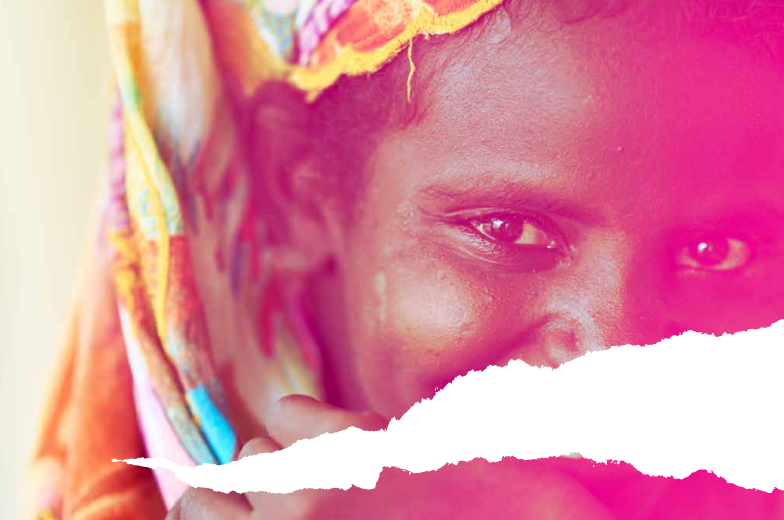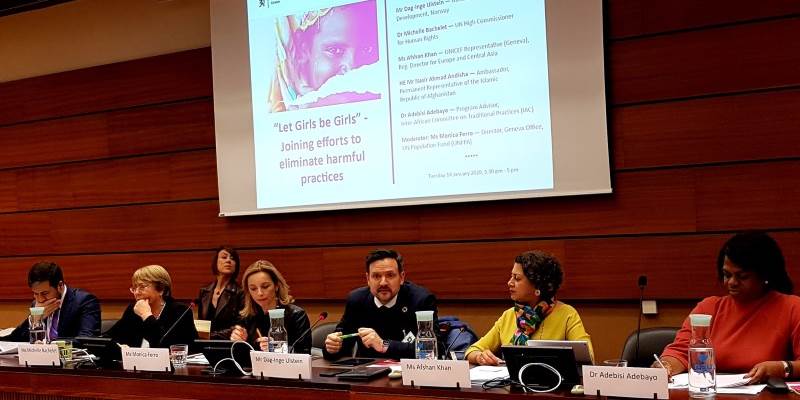
Opening statement by Minister of International Development,
Mr Dag-Inge Ulstein.
Geneva, 14 January 2020
Dear Excellencies, dear friends,
Let me first wish you all a happy new year. It is a great pleasure for me to be in Geneva for the first time since I took office as Minister of International Development, and I could not wish for a more meaningful start of 2020 than being here today to discuss how we can step up our efforts to end harmful practices.
I am happy to have the High Commissioner for Human Rights, Michelle Bachelet, on stage with me, along with our long-time partners in ending harmful practices, UNFPA represented by our moderator Monica Ferro, and UNICEF, represented in this panel by Director Afshan Khan.
I look forward to our discussions.
***
Fighting to end harmful practices is about securing women and girls their universal rights – and it is also about the fight to end extreme poverty. It is about reaching the 2030 goals. We have made a lot of progress in our endeavor to end poverty. But the last lap will also be the hardest.
It will demand from us that we reach the weakest of the weak – the most marginalized. It will demand from us that we leave no one behind. It is about the most basic premise that women and girls are entitled to the same rights and opportunities as men and boys.
That is why Norway, last year, launched a new strategy against harmful practices – stepping up our efforts both in our development assistance and in our normative work. The strategy focuses on: female genital mutilation (FGM), child marriage and son preference. Norway has been one of the largest contributors to the fight against FGM in the last decade. We will continue, and strengthen, this work. We are also increasing our efforts against child marriage.
Furthermore, the strategy adds a new priority: countering the preference for sons and its consequences. We will draw international attention to this issue and contribute to the development of knowledge about what works - and why.
***
We are implementing this strategy by working along two lines:
The first line is through our development assistance, with both the UN and civil society. We are increasing our support to UNFPA and UNICEF, and their important work against both female genital mutilation, and child marriage. In addition, from 2019, we also support UNFPA’s Global Programme to Prevent Son Preference and the Undervaluing of Girls. Last, but certainly not least, we will maintain our valuable collaboration with a number of civil society organizations.
The second line relates to our normative work. The protection of established global norms in the UN, including sexual and reproductive health and rights, is critical in this regard. Geneva is an important arena for these discussions. Standing together, I am determined and hopeful that we will succeed. We will push back “the pushback”.
***
I was asked to point out one thing that would help eliminate harmful practices, but naming only one is difficult. One of the goals of my visit to Geneva is to pick up any new ideas that can help me do my share in making a difference. Having said that, I believe that to make a real difference we must prioritize those who are most vulnerable and marginalized.
To me, working against harmful practices is exactly that: to always stand by women and girls that are being denied their rights. We cannot tolerate that 33 000 young girls are married off each day. We cannot tolerate that millions of girls are suffering female genital mutilation every year. We cannot accept that millions of girls are considered to be of less value than boys, to the extent that they are neglected, subjected to violence, and even murdered.
That being said, there are many experts here today that can tell us that these issues have to be addressed through a wide range of interventions, ranging from legislation, policies, changing norms, education and not least, measures for gender equality.
The local and national context will be different in each country, and policies must be adjusted accordingly. The only way to achieve our goals is to work with partners who have the necessary expertise, networks, commitment and perseverance. We must be determined, but patient, as change takes time.
***
Today, perhaps the most important commitment we can make to women and girls, is to stand firmly behind, and protect the achievements made in Cairo and Beijing 25 years ago.
Norway has already increased funding to eliminate harmful practices with the equivalent of 8 million USD compared to 2018. We commit to keep our funding to eliminate harmful practices at the 2019 level, amounting to approximately 22 million USD each year for the next four years. This comes in addition to our pledge to invest significant amounts in sexual reproductive health and rights for the next 6 years. The responsibility for upholding human rights and eliminate harmful traditional practices rest with each government.
I would like to underline Norway’s role as a consistent partner in our joint efforts to achieve the sustainable development goals. We will collaborate with governments, UN agencies and other multilateral organisations that can demonstrate results.
Many of you are here today.
I commend your hard work to promote gender equality and to end harmful practices, even though there are no quick fixes to eliminating harmful practices. I am convinced that our combined political will and financial contributions will make a difference for the rights, health and lives of women and girls.
Thank you.
Read more: Norway’s International Strategy to Eliminate Harmful Practices 2019–2023
